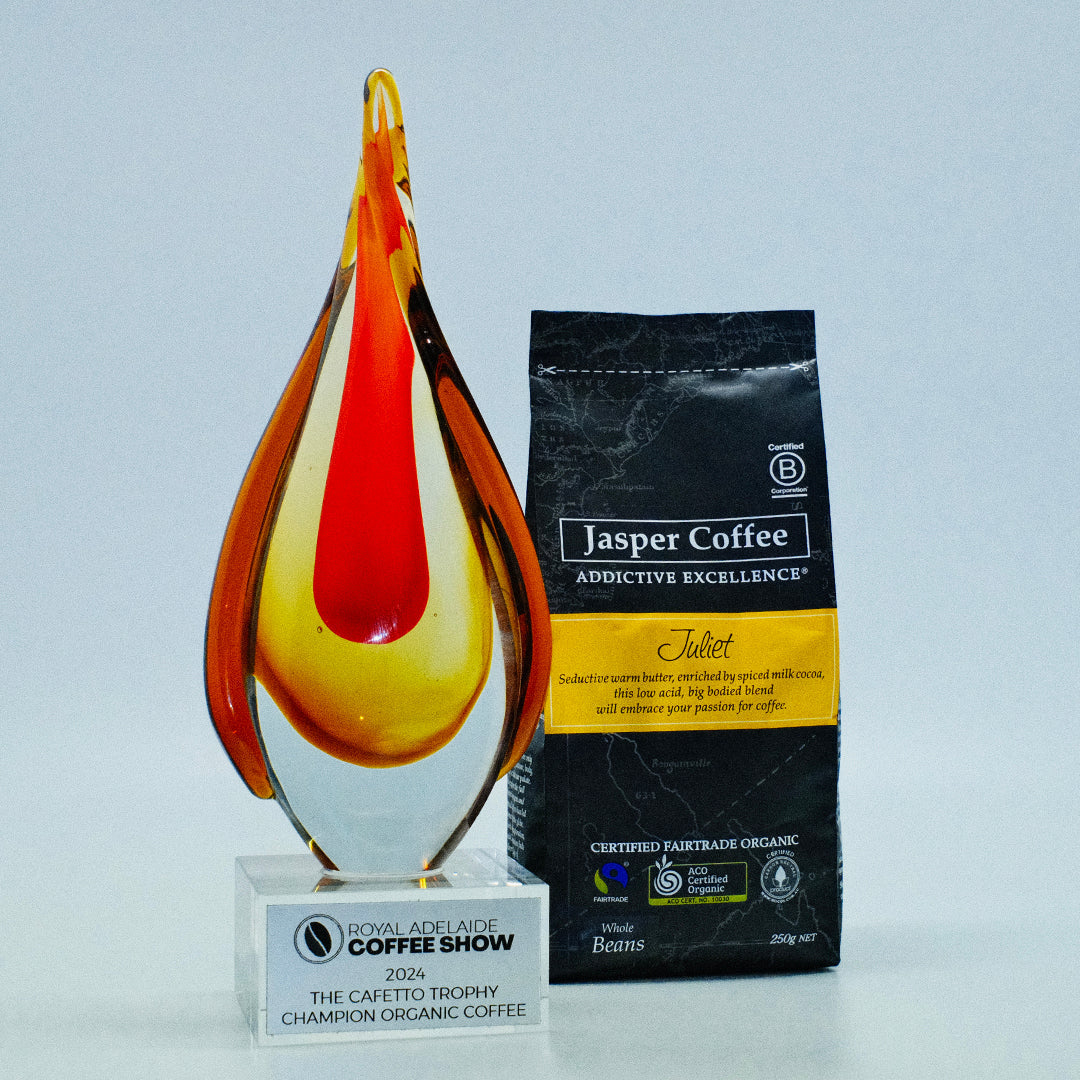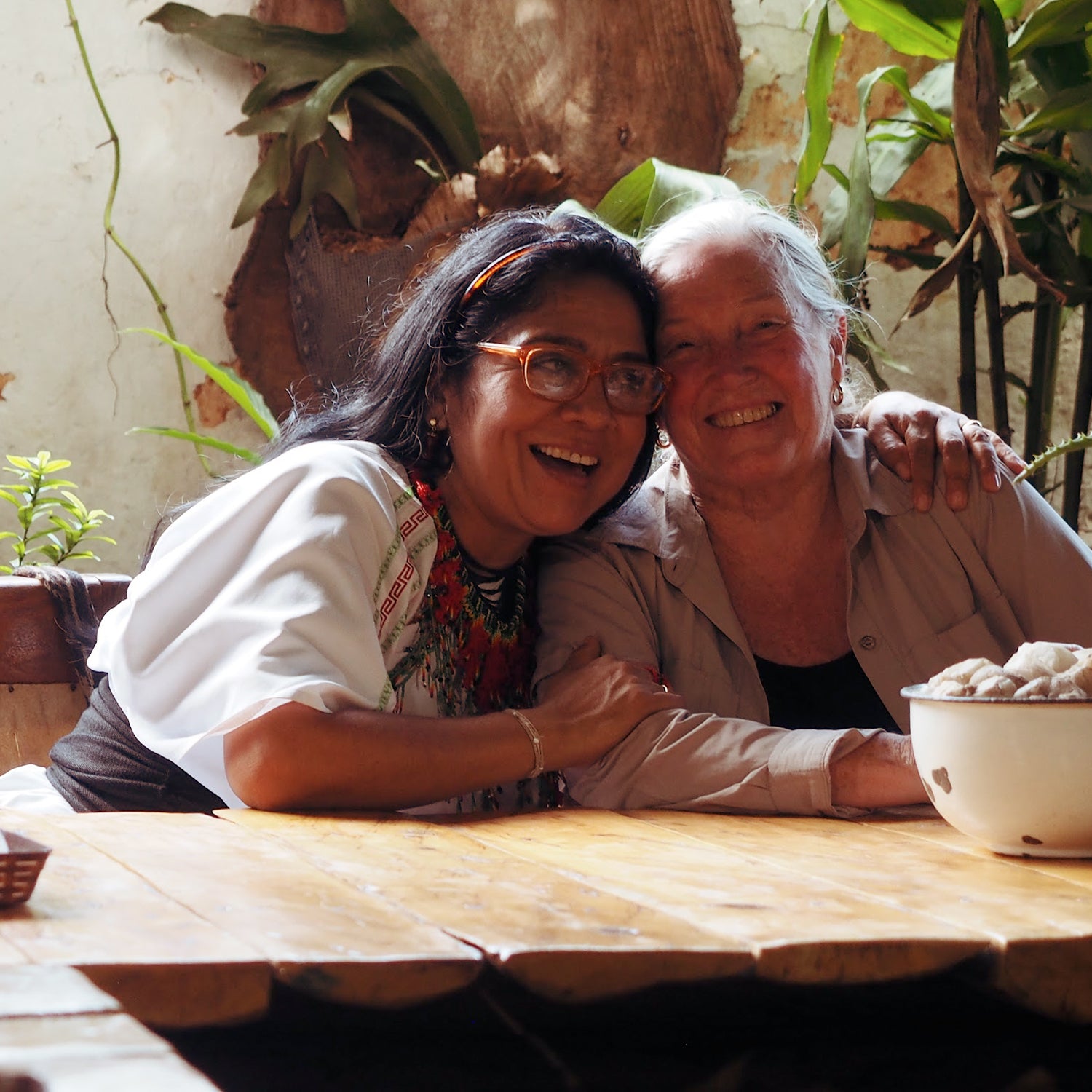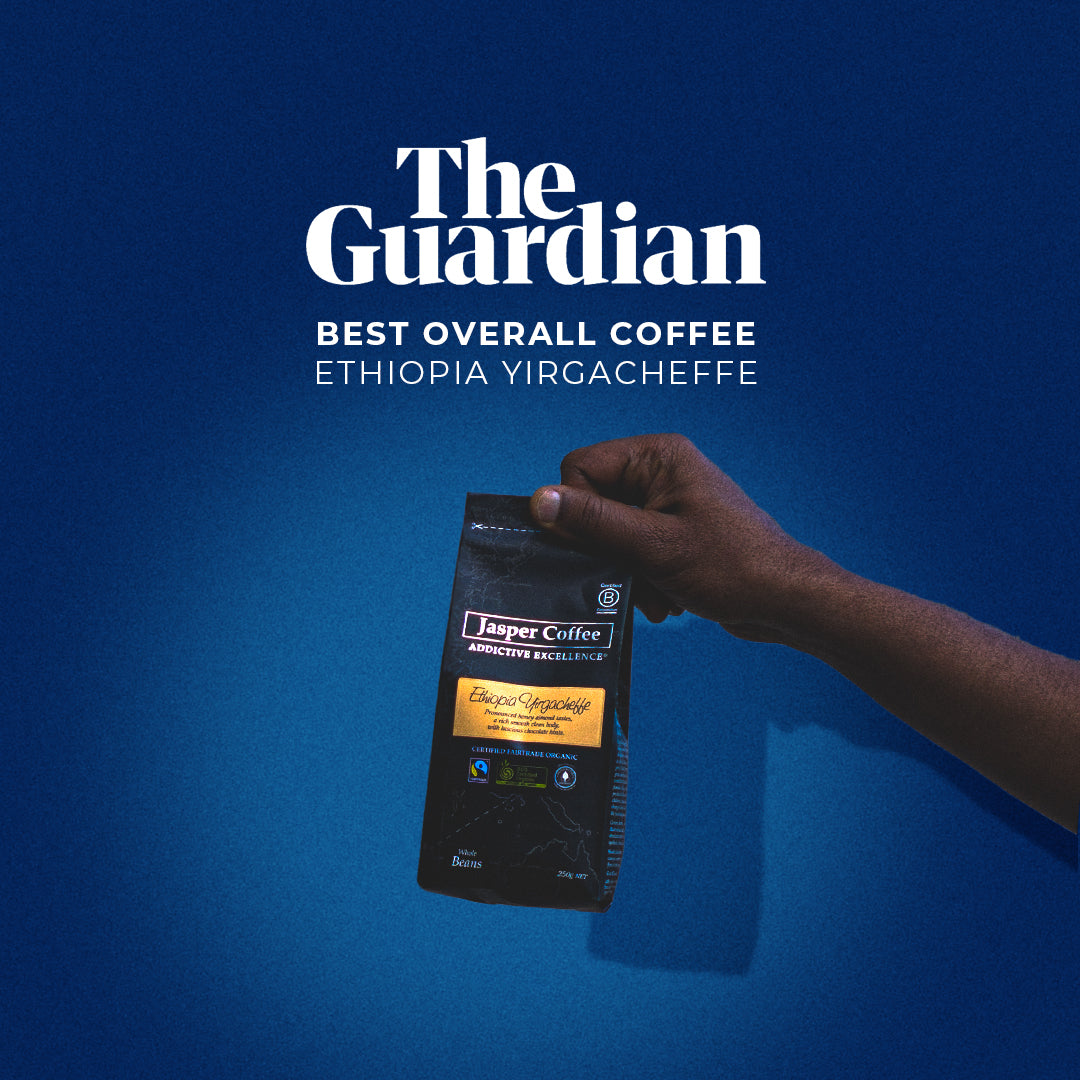The Coffee That Changed Everything: A Love Story Between Your Cup and Their Future
Sarah pressed the warm mug to her lips, inhaling the rich aroma of her morning coffee. Little did she know, thousands of kilometres away in the highlands of Peru, a woman named Natividad was watching her daughter head off to a school built with coffee premiums – including some from Sarah's very own cup.
This is the magic of Fairtrade.
As we journey through Fairtrade Fortnight 2025 (4-17 August), it's time to share some stories that might just change how you think about your daily brew.
The Tale of Two Women: Sarah and Natividad
Let's start with Natividad Vallejos, a coffee farmer in Peru's lush mountains. Fifteen years ago, she joined something revolutionary – a women-led coffee programme called Café Femenino, part of the CECANOR cooperative. Back then, she was just another small-scale farmer struggling to make ends meet in a system that seemed designed to keep her invisible.

But here's where the story gets beautiful: Natividad and over 400 other women decided they weren't going to stay invisible anymore. They banded together, created their own programme, and started demanding fair prices for their exceptional coffee. Today, Natividad owns her land, controls her revenues, and has watched her children grow up to become cooperative members themselves.
The best part? Every time Sarah chooses Fairtrade coffee from companies like Jasper Coffee – who've been working with cooperatives like Natividad's for 22 years – she's directly contributing to schools, libraries, health programmes, and literacy initiatives that transform entire communities.
But Wait, Don't Some People Say Fairtrade Doesn't Work?
You might have heard the critics. "Fairtrade doesn't really help farmers," they say. "It's just expensive coffee with a feel-good sticker."
Let's have an honest chat about that, shall we?
The "It Doesn't Help Economically" Myth
Some studies claim Fairtrade only benefits farmers by a few cents per day. But here's what those studies often miss – it's like judging a community garden by counting only the tomatoes one person harvests, while ignoring the playground, community centre, and health clinic that sprouted up around it.
The real numbers tell a different story entirely:
- $134.2 million AUD in Fairtrade Premium paid to coffee producers globally in 2023
- $27.3 million AUD in direct payments to farmer members
- $4.0 million AUD invested in health and education services
- 775,709 Fairtrade coffee farmers supported worldwide
When Jasper Coffee contributed $42,875 AUD in Premium in 2024 alone from their partnerships, that money didn't just disappear into thin air. It built schools like the one in Ethiopia's Yirgacheffe region, where 1,407 students (688 boys and 719 girls) now have access to state-of-the-art chemistry, biology, and ICT facilities.
The "Small Farmers Can't Afford Certification" Concern
This one sounds logical on the surface – certification costs money, so surely it excludes the smallest farmers?
Actually, it's quite the opposite. The genius of Fairtrade is that individual farmers don't go it alone. They join cooperatives that share certification costs and provide mutual support. It's like a community buying group, but for changing the world.
Take the Yirgacheffe Coffee Farmers' Cooperative Union in Ethiopia. They represent over 45,000 smallholder farmers from 27 cooperatives. Together, they've implemented over 30 Fairtrade premium projects since 2008, benefiting more than 26,000 coffee farmers and community members. None of these farmers could have achieved this impact alone.
There are a multitude of reasons that some farmers may choose not to go down the Fairtrade Certification route. Some farmers find they don't want to be part of a co-operative and are better suited to doing things their own way. Some farmers have plantations that are just far too big for the Fairtrade model. We have seen farmers sign large longterm contracts with big buyers like Starbucks in the past, who will buy up crops for years to come, in cases like this they often end up losing the Fairtrade certification as most of their sales are locked up in non Fairtrade contracts.
It doesn't suit everyone and that's also ok.
The "Fairtrade Coffee Tastes Bad" Misconception
This one makes us chuckle a bit. Have you tried Ethiopian Yirgacheffe recently? It's literally world-renowned for its exceptional quality – and much of it comes from Fairtrade-certified farms producing 100% organic, high-altitude Arabica.
Fairtrade in itself is not a marker of quality, it is a marker of a supply chain designed to help growers. You can buy award winning Fairtrade coffee and you can also find low grade Fairtrade coffee. You're always going to have to seek out the coffee that you like the taste of. At Jasper Coffee we pride ourselves on finding coffees our customers love to drink, each a specialty grade coffee with a responsible supply chain.
The truth is, when farmers receive fair prices and technical support, they can invest in better processing, equipment, and cultivation practices. Quality and ethics don't compete – they dance together beautifully. Often the biggest driver of price for a coffee grower comes from the quality they are able to produce, so they are encouraged to keep improving crop quality each year no matter if they are selling Fairtrade coffee or not.
"Direct Trade Is Better Than Fairtrade"
The Criticism: "Why bother with Fairtrade certification when direct trade cuts out the middleman completely and gives farmers even more money?"
The Reality: This is one of our favourite misconceptions to address because it assumes you have to choose one or the other. Plot twist: you don't!
Direct trade and Fairtrade aren't competitors – they're dance partners.
At Jasper Coffee, we've learned over 22 years that these approaches have different benefits, and can sometimes work together. Direct trade focusses on eliminating intermediaries and building direct sales relationships with growers. This is not always possible for roasters as you need to manage a global supply chain and take on a lot of risk when importing coffee. One of the downsides to direct trade is often a lack of auditing or transparency to ensure growers are treated well and good prices are in fact being paid for their coffee.
While Fairtrade provides a comprehensive framework that goes far beyond just the price of coffee itself.
Here's what Fairtrade brings that direct trade alone doesn't:
Community development infrastructure: Schools, health clinics, and environmental projects funded by the Fairtrade Premium
Democratic governance: Cooperatives that give farmers collective bargaining power and shared decision-making
Standards and monitoring: Ensuring labour conditions, environmental protection, and community investment are sustained over time
Market stability: Guaranteed minimum prices that protect farmers during market downturns
Technical support and training: Helping farmers improve quality and productivity
The best outcomes happen when you find a balance in your approach. We can have long standing relationships with Fairtrade-certified cooperatives, ensuring farmers get premium prices AND their communities benefit from long-term development projects. However we buy our coffee through Australian coffee brokers, like most Australian coffee companies, as this helps us reduce risk in our supply chain and takes managing global logistics (a whole world in itself) off our hands.
Think of it this way: direct trade is like having a wonderful personal relationship with someone, often an individual farm, while Fairtrade is like having that relationship within a supportive community structure that provides healthcare, education, and security for everyone involved. You absolutely could buy Fairtrade coffee directly from small farmer co-ops if you have the capability to manage the logistics.
At Jasper Coffee, our we like long term grower relationships with Fairtrade-certified cooperatives like YCFCU in Ethiopia or CECANOR in Peru mean we get the best of both worlds – personal connections with farming communities, plus the assurance that our purchases contribute to schools educating students, environmental projects preventing thousands of tonnes of CO2 emissions, and women's empowerment programmes that are changing entire regions.
The magic happens when direct relationships meet systemic change. That's where real transformation lives.
The Climate Hero Story You Haven't Heard
Here's something that doesn't make headlines often enough: Fairtrade farmers are climate change warriors.
In Ethiopia, the Oromia Coffee Farmers Cooperative Union installed 8,000 cook stoves that prevented 99,115 tonnes of CO2e emissions in just five years. They've also turned coffee waste into briquette charcoal – essentially creating clean energy from what would otherwise be rubbish. Pretty clever, right?

These aren't just environmental projects; they're survival strategies. Coffee thrives in very specific conditions, and climate change is making those conditions increasingly rare. Fairtrade's focus on environmental sustainability isn't just nice-to-have – it's essential for keeping coffee in our cups for generations to come.
The Jasper Coffee Connection: Australian Fairtrade Pioneers
Now, let's talk about why we at Jasper Coffee get this story so right. Starting 35 years ago in Collingwood, Melbourne, we've always been about exceptional coffee and genuine relationships. But 22 years ago, we did something truly groundbreaking – we launched the first Fairtrade coffees in Australia right at our Prahran Market store.
Think about that for a moment: when most Australians had never heard of Fairtrade, we were already pioneering ethical coffee sourcing, introducing customers at that bustling Melbourne market to the idea that their morning cup could change lives on the other side of the world.
From that historic launch, we've built genuine partnerships with producer organisations across Papua New Guinea, Peru, Colombia, Honduras, Nicaragua, Ethiopia, and Timor-Leste. In 2024 alone, we supported 133,217 farmers in our supply chain, selling 62,578 kg of coffee on Fairtrade terms.
When Elizabeth Duna, a Fairtrade coffee farmer from Papua New Guinea, visited Australia during Fairtrade Fortnight 2024, she didn't just do interviews and panels. She visited our roastery, met our team, and experienced firsthand the coffee journey from farm to cup. While we don't source Elizabeth's specific coffee, we do offer exceptional Fairtrade organic coffee from Papua New Guinea – representing the same commitment to quality and community that Elizabeth champions.
That connection – between Australian coffee lovers and Papua New Guinea's coffee farming communities – traces back to those pioneering days at Prahran Market, where we first introduced Australians to the revolutionary idea that great coffee and great ethics could go hand in hand.
The Ripple Effect: How Your Morning Choice Changes Everything
Here's the thing about Fairtrade that gets us genuinely excited: it's not charity. It's not a handout. It's a complete reimagining of how trade can work when everyone in the chain – from farmer to roaster to you – believes that commerce can be a force for good.
When cooperatives invest their Fairtrade Premium, here's how they typically spend it:
- 33.1% on Business & Organisational Development (helping farmers become better business people)
- 33% on Environmental Investment (protecting the planet that grows our coffee)
- 24.8% on direct Financial Benefits (immediate support for farming families)
- 5.3% on Social Investment (community projects like schools and health clinics)
- 3.1% on Production improvements (making better coffee)
Every category creates ripples. Better business skills lead to higher incomes. Environmental protection ensures coffee can grow for decades to come. Schools educate the next generation. Health clinics keep farming communities strong. Production improvements create coffee that makes your morning extraordinary.
Your Next Chapter Starts Here
This Fairtrade Fortnight (4-17 August 2025), we invite you to become part of this ongoing story. Not because you have to, but because you get to.
When you choose our Fairtrade-certified beans, you're not just buying coffee – you're joining a 22-year-old love story between Australian coffee lovers and farming communities around the world. You're supporting women like Natividad who are rewriting the rules of what's possible. You're backing environmental innovators who are turning coffee waste into clean energy.
Most importantly, you're proving that quality and conscience aren't opposites – they're perfect brewing partners.
The Perfect Ending (That's Actually a Beginning)
Sarah finishes her coffee, sets down her mug, and smiles. She's just realised that her morning ritual isn't just about caffeine anymore. It's about connection, community, and the quiet revolution happening one cup at a time.
Tomorrow, she'll brew another cup. And thousands of kilometres away, Natividad will tend her coffee plants, knowing that her work matters, her voice is heard, and her community's future is brewing beautifully.
Because the best coffee doesn't just taste good – it does good too.
Ready to taste the difference that 22 years of genuine partnerships make? Explore our exceptional range of Fairtrade-certified beans at JasperCoffee.com. Learn more about the global impact of your coffee choices at Fairtrade ANZ.













